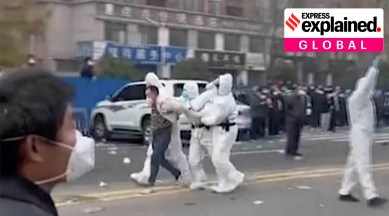Why over 20,000 recruits have left Apple supplier Foxconn’s plant in China
In rare scenes of open dissent in China, workers at an iPhone manufacturing plant in Zhengzhou took out a violent protest this week. Following this, more than 22,000 employees quit. What's behind the unrest?

Apple’s largest iPhone manufacturing plant in Zhengzhou is grappling with multiple issues — workers’ unrest, uncertainty over fulfilling the targets set for November-end and, in the latest, reported resignation of more than 20,000 employees.
A Foxconn source familiar with the matter informed Reuters Friday that the employees, most of them new hires not yet working on the production line, have left Foxconn’s Zhengzhou plant in China.
The company had set a target of resuming full production by the end of November, and the latest departures would complicate the target, the person said. However, Foxconn declined to comment.
Moreover, the departures also come in the wake of the firm offering $1,396 (10,000 yuan) to workers who wished to leave the plant.
What is the Foxconn controversy in China?
On Wednesday, hundreds of workers joined protests at the Zhengzhou iPhone plant. Footage uploaded on social media showed men smashing surveillance cameras and windows.
The unrest marked rare scenes of open dissent in China. According to workers, the cause of the open dissent was overdue pay on top of ultra-severe Covid rules.
Earlier this month, Foxconn had launched a hiring drive wherein it promised higher salaries as well as bonuses. This came after the firm enacted measures to stop the spread of Covid-19 in October. The curbs imposed by the company forced many workers to isolate, besides the factory’s conditions also led to many of the employees fleeing.
Some workers even complained that they were forced to share dormitories with colleagues who had tested positive for Covid-19.
In the videos posted on Chinese social media, crowd could be seen queuing up for buses. “It’s time to go home,” said one of the posts. Workers can also be seen chanting “Give us our pay!” in the videos.
What has Foxconn said?
In the light of the workers’ protest, Foxconn, formally called Hon Hai Precision Industry Co Ltd, has stated that it had fulfilled its payment contracts. It also claimed that the reports of employees forced to share room with infected staff were “untrue”.
The company added, “Regarding any violence, the company will continue to communicate with employees and the government to prevent similar incidents from happening again.”
Foxconn controversy in China: what impact will it have on iPhone production?
A source familiar with the matter gave a grim picture saying that Foxconn is unlikely to achieve the target of resuming full production at the plant because of the disruptions caused by the unrest which has impacted the new recruits who were supposed to bridge the gap in the workforce.
Nevertheless, another source claimed that production at the plant was unaffected by the unrest, adding that the output remained “normal”.
Foxconn’s shares have dipped 2 per cent since the unrest emerged in late October.
D A Davidson, analyst, Thomas Forte, informed Reuters that the disruptions may shift some iPhone sales into the March quarter from the key holiday quarter.
What happened in October?
In late October, Foxconn had imposed a closed loop system at the Zhengzhou iPhone plant. Under the system, staff both live and work on site, isolated from the wider world.
Discontent began over stringent quarantine rules, Foxconn’s inability to curb Covid outbreaks and miserable conditions, including food shortages.
Following this, former workers estimate that thousands have fled the factory campus. Thus, to retain staff and lure more workers, the company has had to offer bonuses and higher salaries.
Foxconn also expressed apologies for committing a pay-related “technical error” when hiring new recruits, even as workers claimed that it was a factor that led to protests involving clashes with security personnel.
(With inputs from Reuters)